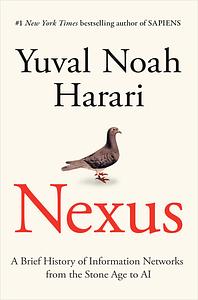You need to sign in or sign up before continuing.
Take a photo of a barcode or cover
1.02k reviews for:
Nexus: A Brief History of Information Networks from the Stone Age to AI
Yuval Noah Harari
1.02k reviews for:
Nexus: A Brief History of Information Networks from the Stone Age to AI
Yuval Noah Harari
informative
medium-paced
Net zoals 'Sapiens', dat ik een paar jaar geleden las, vond ik 'Nexus' aan de repetitieve/oppervlakkige kant. De historische voorbeelden waren interessant, maar de 'lessen' die we eruit kunnen leren worden wat oppervlakkig behandeld. De toekomstplannen die we moeten(!) ondernemen, blijven voor mijn gevoel vaak hangen bij de term 'zelfcorrigerende mechanismen', zonder écht concrete voorbeelden van (al-bestaande) plannen te noemen. Het einde is wel wat pessimistisch, al zal dat wel terecht zijn vanuit het perspectief van de auteur.
Je merkt wel dat AI en de techwereld zich enorm snel ontwikkelt, want bijvoorbeeld de 'truth-seeking' AI van Elon Musk, waar Harari het over had, is inmiddels niet meer dan een bot die onwaarheden op Twitter verspreidt. Benieuwd naar hoe 'Nexus' over een paar jaar leest, om te kijken welke voorspellingen wél en niet zijn uitgekomen.
Je merkt wel dat AI en de techwereld zich enorm snel ontwikkelt, want bijvoorbeeld de 'truth-seeking' AI van Elon Musk, waar Harari het over had, is inmiddels niet meer dan een bot die onwaarheden op Twitter verspreidt. Benieuwd naar hoe 'Nexus' over een paar jaar leest, om te kijken welke voorspellingen wél en niet zijn uitgekomen.
informative
slow-paced
dark
informative
reflective
slow-paced
informative
slow-paced
informative
medium-paced
informative
medium-paced
This book was a mixed bag for me. While the first half is a discussion of the development of information networks through history (some of which I agree with, and some of which – as an historian myself – I have some big issues with). But the meat of the book is in the second half, which discusses AI and its potential risks to societies and humanity as a whole. Some of what Harari discusses, I agree with and is demonstrably true. Lots of people DO have their opinions shaped by social media algorithms, which are (often) designed to increase engagement, which often means increasing outrage. But some of it, I think, is making the exact same error as the all-in tech bros regarding AI: thinking that AI can become so powerful that it could potentially destroy civilizations or the world. Sure, individual algorithms can wield a fair amount of power (for example, the bulk of trading on the stock exchange at this point is just computers talking to other computers). But at the end, all those algorithms are designed by and in service to human people. Literally any of them could pull the plug or modify them at any moment. Shockingly to me, in a book that spends so much time discussing democracies and totalitarianism, there is zero discussion of capitalism. (The word only appears twice in the entire book.) I do agree with Harari, though, that a big discussion point of the future of AI should be how to include self-correcting mechanisms, whether internal to the Ais themselves or through human oversight. Oh, and one tiny nitpick: Harari spends a lot of time talking about “intersubjective realities.” There’s a term for this already, it’s “social construct.” Anyway, I could probably write some very long essays about all my thoughts on this book, so I suppose it was at least successful in getting me to think about the topic, even if it didn’t succeed in persuading me toward its conclusions.
challenging
informative
reflective
medium-paced



